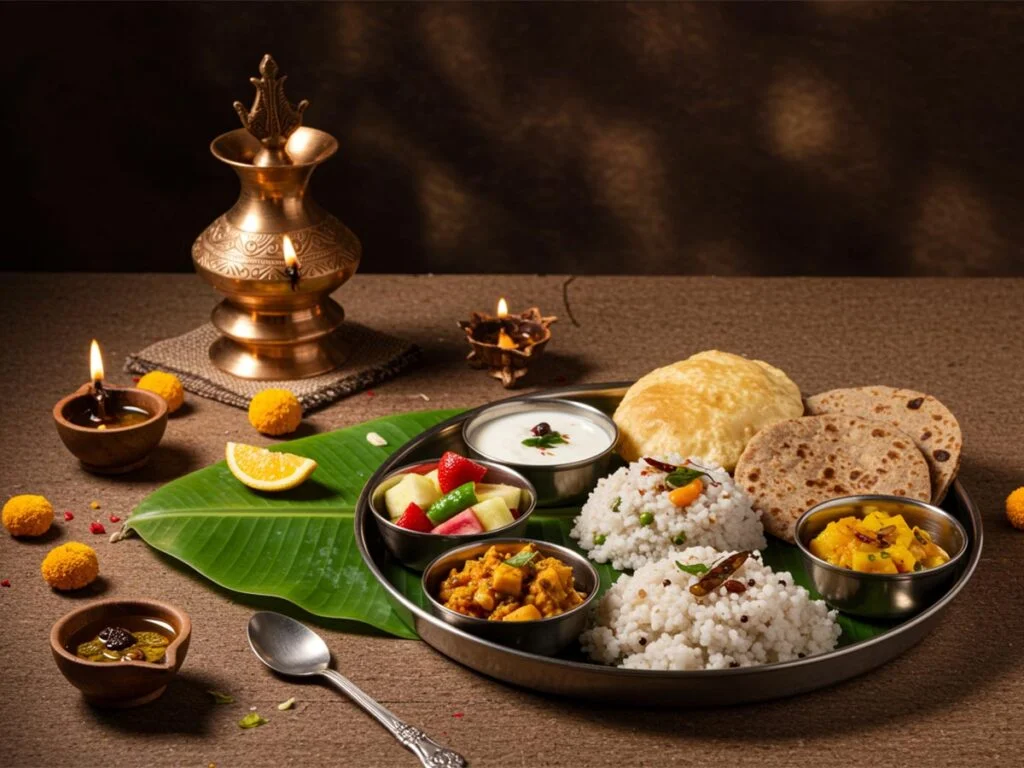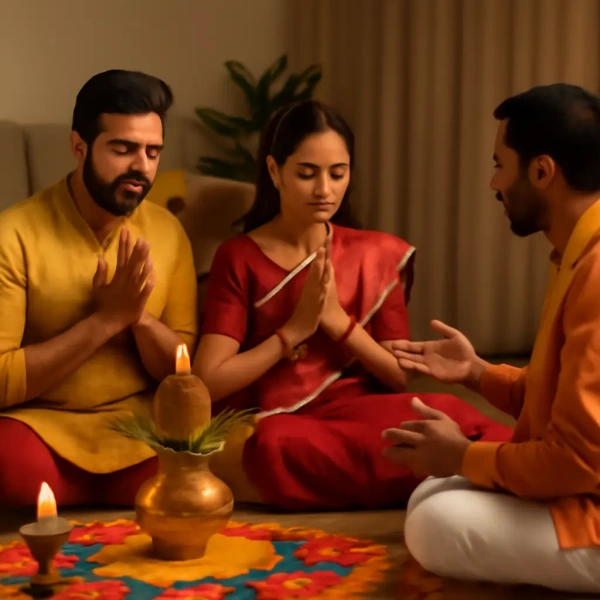
Introduction
Sunday fasting, or Ravivar Vrat, is one of the most powerful and ancient Hindu practices to honour Surya Dev (the Sun God). In Vedic astrology, the Sun represents vitality, confidence, leadership, health, and authority. A weak Sun in one’s horoscope can manifest as low self-esteem, health issues, and strained relationships with fatherly figures or superiors.
By observing a disciplined fast on Sunday, wearing the Sun’s colours, and chanting mantras, one can balance Surya’s energy and invite strength, health, and success into life.
Mythological Significance (Ravivar Vrat Katha)
According to legend, there was once a poor Brahmin woman who devotedly fasted on Sundays to honour the Sun God. Despite her hardships, she never skipped the rituals. Over time, Surya was pleased with her devotion and blessed her with wealth, good health, and a happy family life. This story is told during Ravivar Vrat as a reminder that sincere worship can remove obstacles and bring prosperity.
In the Ramayana, it is said that Lord Rama recited the Aditya Hridayam Stotra before his final battle with Ravana, gaining renewed energy and clarity from Surya’s blessings.
Want to know more about Deity Worship & Puja
Auspicious Timings
- Best Time for Arghya: Within the first hour after sunrise.
- Special Sundays: Sundays falling on Pushya Nakshatra, or during auspicious solar transits, are considered especially powerful.
- Fasting Duration: One Sunday, 11 Sundays, 21 Sundays, or 30 Sundays, depending on your intention.
Step-by-Step Sunday Fasting Ritual
- Morning Preparation
- Wake before sunrise, bathe, and wear red, orange, or yellow clothing.
- Prepare a copper vessel with water, red flowers, rice, and a little red sandalwood.
- Offer arghya to the Sun while chanting:
Om Hraam Hreem Hraum Sah Suryaya Namah
- Wake before sunrise, bathe, and wear red, orange, or yellow clothing.
- Worship Ritual
- Light a ghee lamp facing east.
- Offer red flowers, jaggery, wheat, and water to Surya.
- If possible, read the Aditya Hridayam or Surya Ashtakam.
- Light a ghee lamp facing east.
- Charity
- Donate red cloth, copper vessels, wheat, or jaggery to the poor or a temple.
- Donate red cloth, copper vessels, wheat, or jaggery to the poor or a temple.
- Breaking the Fast
- Do this after sunset with a light Satvik meal.
- Do this after sunset with a light Satvik meal.
Mantras for Surya Dev
1. Beej Mantra:
Om Hraam Hreem Hraum Sah Suryaya Namah
Meaning: Salutations to the Sun God, the source of light and life.
2. Surya Gayatri Mantra:
Om Bhaskaraya Vidmahe, Mahadyutikaraya Dhimahi, Tanno Surya Prachodayat
Meaning: May we meditate upon the Sun God, the source of great light, who illuminates our mind and soul.
Chanting 108 times is recommended.
Detailed Diet Plan
Full Fast (Nirjal): Only water until sunset.
Partial Fast (Phalahar): Fruits, milk, and coconut water during the day.
Satvik Diet: Avoid salt, onion, garlic, and grains. Eat simple vegetarian food.
Suggested Meals:
| Time | Food Suggestions |
| Morning | Jaggery water, soaked raisins, and tulsi leaves |
| Mid-Morning | Fresh fruit juice (without sugar), coconut water |
| Afternoon | Boiled pumpkin, bottle gourd, plain curd |
| Evening | Sabudana khichdi (with rock salt), herbal tea |
| After Sunset | Light khichdi or milk with turmeric |
Remedies to Enhance the Vrat
- Light a ghee lamp with red flowers at the home altar.
- Feed cows with jaggery and wheat.
- Offer water to the Sun daily, even if not fasting.
- Wear a ruby gemstone if advised by an astrologer.
- Keep a Surya Yantra in your place of worship.
Spiritual & Scientific Benefits
| Spiritual Benefit | Scientific Benefit |
| Boosts confidence and leadership | Exposure to morning sunlight boosts Vitamin D |
| Improves relationships with authority | Fasting improves digestion and metabolism |
| Enhances energy and health | Early rising aligns the circadian rhythm |
| Removes karmic blockages | A light diet reduces oxidative stress |
Do’s and Don’ts
Do’s:
- Wake early and offer arghya to the Sun.
- Wear bright colours like red, orange, or yellow.
- Maintain positive thoughts and speech.
- Give charity related to the Sun.
Don’ts:
- Avoid anger, arguments, and harsh speech.
- Do not consume non-veg, alcohol, onion, garlic, or processed food.
- Avoid sleeping during the day unnecessarily.
Frequently Asked Questions (FAQ)
Q1: Who can observe Ravivar Vrat?
Anyone seeking better health, leadership skills, and harmonious relationships can achieve it.
Q2: Can I drink water during the fast?
Yes, unless you choose the strict nirjal fast, which involves no water until sunset.
Q3: What if I miss a Sunday?
Continue next week. The vrat is flexible, and devotion matters more than perfection.
Q4: Can pregnant women or those with health conditions fast?
They should avoid strict fasting and opt for a Satvik diet instead, after consulting a doctor.
Q5: Is it necessary to wear red or orange?
It’s symbolic of Surya’s energy and is recommended, but not mandatory.
Commitment Plan
For stronger results, observe the vrat for 11 consecutive Sundays.
Keep a journal to record intentions, experiences, and blessings noticed.
Closing Prayer
“O Surya Dev, source of life and light, may your rays remove all darkness from my life, bring me health, strength, and wisdom, and guide me on the righteous path.”
Conclusion
The Ravivar Vrat is more than just a fast—it is a spiritual discipline that strengthens both the mind and body. By aligning with the Sun’s energy, you can boost your vitality, improve focus, and invite positivity into your life. Whether you observe it for a short period or as a lifelong practice, the benefits—both spiritual and practical—are long-lasting. Through devotion, discipline, and consistency, the Sunday fast becomes a path to inner strength and outer success.
